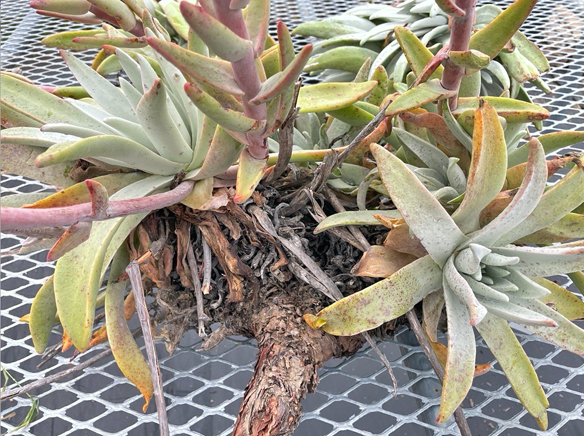
Catalina is home to many rare and protected species of both plants and animals. It is one of the Island’s unique attributes that makes it such a special place not only for those who call it home, but for the many nature-loving visitors that travel across the Channel each year. Unfortunately, some of the exceptional species of our fragile Island ecosystem are particularly vulnerable to threats beyond habitat loss, including illegal collecting.
One of these fascinating species is the island liveforever (Dudleya virens ssp. insularis), which is native to the Channel Islands. It is easy to appreciate these plants. The charismatic succulent grows in small rosettes and has adapted to thrive in the Island’s climate. During spring and early summer, liveforevers produce lovely, slender stalks that bloom pink, yellow, or orange to add a vibrant splash of color to the rocky coastal landscape. They are a food source to native wildlife and important for natural erosion control.
Recently, Catalina Island Conservancy Rangers intercepted the illegal removal of several mature liveforevers, rescuing the rare succulents. The largest plant taken was several decades old.
“These wild-harvested plants were an exceptionally large species and are significant contributors to the gene pool of the local plant population,” said Catalina Island Conservancy Rare Plant Ecologist Kevin Alison. “They were taken from the landscape before they were able to produce flowers and seed, so in addition to these lovely individual plants being removed, all the potential future plants were eliminated as well. This loss diminishes the resilience of these rare plants to survive into the future, especially at the local population level.”
“Harvesting plants from the wild is removing important pieces to a larger ecological puzzle,” Alison added. “The entire ecosystem feels the negative impact of these missing plants.”
Dudleya virens ssp. insularis bears a California Rare Plant Rank of 1B.2 (designating that it is rare, threatened, or endangered in California and elsewhere; fairly threatened in California). In 2021, California passed AB 223 with overwhelming bipartisan support, providing important protections for many subspecies of Dudleya by establishing penalties for those who illegally remove them from state and private lands without a permit and landowner permission. In California, poaching the imperiled Dudleya comes with a $5,000 fine per plant.
“Though it may look like the cliffs of Catalina are bursting with these beautiful native succulents, they are, in fact, quite rare and important to the Island ecosystem,” said Conservancy Sr. Director of Conservation Lauren Dennhardt. “We appreciate the Rangers protecting biodiversity and being amazing advocates for Catalina’s wildlands.”
Rangers delivered the salvaged succulents to the Ackerman Native Plant Nursery where they are awaiting transplanting back onto the landscape. Catalina Island Conservancy has Dudleya virens ssp. insularis in its conservation collection at the Native Plant Nursery and produces plants for restoration.
“All the island liveforever plants at the Ackerman Native Plant Nursery are ethically grown from seed,” added Alison. “Therefore, these plants are available to the public without negative impacts to the plants in the wild.”
To inquire about legally obtaining a responsibly propagated Dudleya from the Nursery, contact Alison at kalison@catalinaconservancy.org.
The public can report suspicious activity by contacting Catalina Island Conservancy’s Rangers at (310) 510-0393, the U.S. Fish and Wildlife Service Office of Law Enforcement at 1-844-FWS-TIPS, or the California Department of Fish and Wildlife’s CalTIP at 1-888-334-CalTIP.










